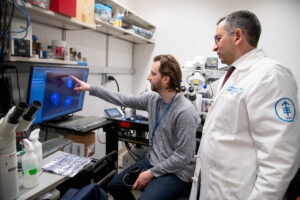Samuel Bakhoum, MD, PhD ‹ Back To 2024 Winners
2024 Winners
Associate Member
Human Oncology and Pathogenesis Program
Memorial Sloan Kettering Cancer Center
Vision
Our overarching vision is to understand how chromosomal instability drives cancer progression in order to develop selective therapeutic strategies to target some of the most aggressive forms of human cancer and for which there currently no adequate treatments.
Samuel Bakhoum is a physician-scientist at Memorial Sloan Kettering Cancer Center where he is an associate attending physician in the Department of Radiation Oncology and an associate member in the Human Oncology and Pathogenesis Program. His laboratory focuses on understanding the causes and consequences of chromosomal instability in cancer. Dr. Bakhoum’s group established a critical link between chromosomal instability and cancer metastasis through the generation of chronic inflammation, leading to the identification of novel therapeutic approaches and drug targets that are selective to tumors with chromosomal instability. A second area of interest in Dr. Bakhoum’s laboratory is uncovering the link between chromosomal instability and epigenetic dysregulation, two hallmarks of advanced and metastatic cancers. Dr. Bakhoum is also a scientific cofounder of Volastra Therapeutics, a biotech startup company aiming to target chromosomal instability in advanced and metastatic cancers.
Dissecting The Role of Micronuclei In Tumor Evolution

The capacity of cancer cells to evolve is a major therapeutic challenge. It endows the tumor with the ability to spread, resist therapy as well as evade the immune system. Work over the past decade has implicated a phenomenon called chromosomal instability as a key driver of cancer adaptation and progression. Chromosomal instability enables cancer cells to shuffle their chromosomes each time they divide, promoting genetic heterogeneity. As such cancers with chromosomal instability have a tendency to spread to distant organs, resist treatment, as well as evade immune surveillance. We and others have identified chromosome-containing structures called micronuclei that play a key role in driving cancer progression.
“The prize will enable us to delve into the intricate mechanisms by which chromosomal instability (CIN) drives cancer progression. Specifically, it will facilitate the investigation of how micronuclei, structures containing missegregated chromosomes, impact cancer cell behavior and genomic integrity through defects in RNA splicing. This understanding could potentially lead to the identification of new therapeutic targets and strategies to combat aggressive cancers associated with chromosomal instability.”
 These micronuclei are a hallmark of cancers with chromosomal instability, and they catalyze the rapid evolution of the cancer genetic material, known as the genome. Our preliminary data identified that these micronuclei are defective in processing messenger RNA that is required for the genome to be properly translated into proteins. In this proposal, we aim to first understand – on the cellular level – how these defects impact cancer cells behavior and whether abnormalities in micronuclei can lead to long-lasting changes to the cancer genome that facilitate cancer evolution. This work has the potential to uncover new treatment strategies for cancers with chromosomal instability, which represent some of the deadliest subsets of human cancers.
These micronuclei are a hallmark of cancers with chromosomal instability, and they catalyze the rapid evolution of the cancer genetic material, known as the genome. Our preliminary data identified that these micronuclei are defective in processing messenger RNA that is required for the genome to be properly translated into proteins. In this proposal, we aim to first understand – on the cellular level – how these defects impact cancer cells behavior and whether abnormalities in micronuclei can lead to long-lasting changes to the cancer genome that facilitate cancer evolution. This work has the potential to uncover new treatment strategies for cancers with chromosomal instability, which represent some of the deadliest subsets of human cancers.
“The innovation lies in the unique and comprehensive approach undertaken to understand the role of micronuclei in cancer as well as linking chromosomal instability and RNA splicing, two processes that are intimately associated with tumor progression. Micronuclei have long been an overlooked feature of cancer yet they hold promise to develop therapies that are selective to cancer cells with chromosomal instability.”